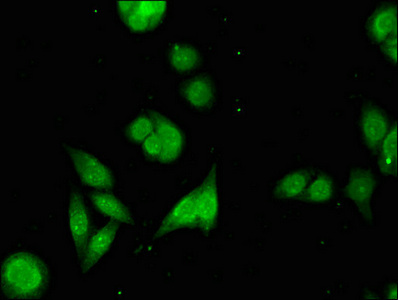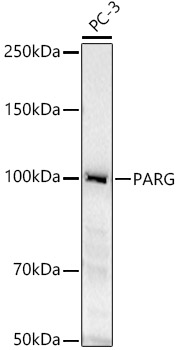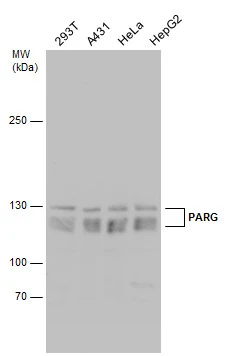
Immunofluorescent analysis of PC-3 cells using CSB-PA773045LA01HU at dilution of 1:100 and Alexa Fluor 488-congugated AffiniPure Goat Anti-Rabbit IgG(H+L)
PARG Antibody
CSB-PA773045LA01HU
ApplicationsImmunoFluorescence, ELISA
Product group Antibodies
ReactivityHuman
TargetBPHL
Overview
- SupplierCusabio
- Product NamePARG Antibody
- Delivery Days Customer20
- ApplicationsImmunoFluorescence, ELISA
- CertificationResearch Use Only
- ClonalityPolyclonal
- ConjugateUnconjugated
- Gene ID670
- Target nameBPHL
- Target descriptionbiphenyl hydrolase like
- Target synonymsBPH-RP, MCNAA, VACVASE, serine hydrolase BPHL, L-homocysteine-thiolactonase BPHL, biphenyl hydrolase-like (serine hydrolase), biphenyl hydrolase-related protein, breast epithelial mucin-associated antigen, valacyclovir hydrolase, valacyclovirase
- HostRabbit
- IsotypeIgG
- Protein IDQ86W56
- Protein NamePoly(ADP-ribose) glycohydrolase
- Scientific DescriptionPoly(ADP-ribose) synthesized after DNA damage is only present transiently and is rapidly degraded by poly(ADP-ribose) glycohydrolase (PubMed:23102699). PARG acts both as an endo- and exoglycosidase, releasing PAR of different length as well as ADP-ribose monomers (PubMed:23102699). Required for retinoid acid-dependent gene transactivation, probably by dePARsylating histone demethylase KDM4D, allowing chromatin derepression at RAR-dependent gene promoters (PubMed:23102699). Involved in the synthesis of ATP in the nucleus, together with PARP1, NMNAT1 and NUDT5 (PubMed:27257257). Nuclear ATP generation is required for extensive chromatin remodeling events that are energy-consuming (PubMed:27257257).
- ReactivityHuman
- Storage Instruction-20°C or -80°C
- UNSPSC41116161




